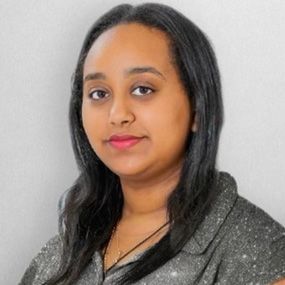
Clinical research coordinator Bethel Sebsebie is a long way from her Ethiopian home: 7,236 miles to be exact. In the seven years since she came to the United States, she’s learned to adapt to a new culture and build a strong career in clinical research — and she’s done checking to-dos off her list. As far away as she is from home, she keeps certain traditions alive that have helped her build community in her new(ish) home.
What’s your story?
I was born and raised in Ethiopia and came here as a first-generation college student. I got my undergraduate degree in Biology with a minor in neuroscience from Drexel University, which is in Pennsylvania. After I graduated, I came to DC to go to Georgetown University for my graduate program, where I did some cancer research in a lab. My master’s is in Biomedical Science with a concentration in Integrative medicine and Health Science.
Throughout my academic journey, I’ve been heavily involved in research. Here at GW, I work as a clinical research coordinator. I get to combine my passion for science and clinical research with patient care. I also mentor students back home in Ethiopia. All of this is very fulfilling and has helped shape who I am becoming.
I’ve been in the United States on my own since I arrived in 2017. It was hard at first, being away from home and my family. This was a whole new culture and new everything. It’s been quite an experience.
I want to become a physician — so I’ll have to go back to school! Since working in oncology, I think that’s the area I’d like to pursue. It’s such an interesting field and I’ve been mentored by an amazing team.
What gets you out of bed in the morning?
That’s an easy question to answer. It’s the opportunity to contribute — even if it’s only a little bit — to make a difference in my patients’ lives. I don’t have the words to describe how their courage and resilience inspires me. For some of our Phase I clinical trial patients, this is their final hope. They’ve exhausted all the standard of care options. They come in frequently and I’ve gotten to know many of them personally. I know their stories and their families.
My parents are such a source of motivation and my biggest supporters. They encourage me! They’ve taught me the value of hard work and compassion, but to also give back to my community. That’s why I like volunteering. I tutor kids in Ethiopia and help them study for their national exams, and I volunteer at a senior center.
What’s that one book that has influenced you the most?
My freshman English professor introduced me to a wide variety of genres and we still keep in touch. We text and call each other and sometimes meet over Zoom. When I graduated from Georgetown, she sent me Unaccustomed Earth, a book by her favorite author, Jhumpa Lahiri. It’s eight short stories that explore the experience of leaving home and adjusting to a new country with a completely different cultural perspective. It reminded me of the challenges and cultural transitions I faced when I first came here and how it felt to adapt to a new environment.
This book has sparked my interest in reading, so I try to find the time to read even a little bit.
What absolutely excites right now in cancer research?
What excites me most right now is the future of clinical trials and the medicines that are being developed. Each new trial represents a step closer to unlocking solutions for curing cancer and other diseases. We’ve come so far and there’s still much more we have to learn.
That we can develop personalized cancer vaccines that are unique to each patient and to the mutational profile of their tumors is amazing. Basically, we’re decoding the tumor cells to create a vaccine and training the T-cells — the immune system — to recognize and destroy the cancer cells. These are cutting-edge treatments. It’s very inspiring and motivating.
But that’s only part of it. Because I also work directly with patients, I’ve had the opportunity to see what a clinical trial looks like through their eyes. This is all new to them and often, they’re very nervous. So I’ve learned to really listen to them. And when I listen, I hear their stories — and each of them has their own unique stories. Getting to know my patients adds a deeper dimension to the research.
What’s the most interesting thing we should know about you?
I’m not a big coffee drinker — it makes my heart beat faster. But in my country, we have a coffee ceremony everyday around 4:00 p.m. Neighbors, friends, family, we all come together to talk after work and drink coffee. It’s a different type of pot, called a jabena, and it’s tradition to roast the beans, then grind them, and then brew the coffee. The cups are very tiny, and we sip and eat popcorn, and we talk and we catch up on life. So even though I’m not a big fan of coffee, I’m a big fan of the coffee drinking ceremony. And it’s not a short ceremony. It takes at least an hour, up to two hours. But the time flies without you ever knowing it.



